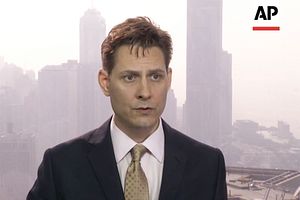I last saw Michael Kovrig in Italy in October 2018. I last saw Michael Spavor in South Korea in November 2018. Within weeks of us bidding farewell, both of them were picked up by Chinese authorities, detained first without charges for the near-maximum duration that arbitrary detention is legally permissible in China. Thereafter, the two were stuck with exaggerated and outrageous charges concerning espionage activities.
In reality, their only “crime” – if it can be called that – was being Canadian. Kovrig and Spavor were taken hostage and the ransom for their release, even if officially unsaid, is the end of legal troubles for Meng Wanzhou, the chief financial officer of Chinese technology giant Huawei, who was charged last year with knowingly spearheading the company’s violation of U.S. sanctions. Both men were arrested shortly after Meng’s initial arrest.
As much as anything else, this hostage diplomacy has laid bare the Communist Party’s brutish approach to statecraft. The gambit hasn’t worked because despite the pain and abuse both men have endured, Canada has remained committed to letting the rule of law run its course on Meng’s still-pending extradition to the United States.
The two men have had consular visits from Canadian officials, but accounts of their treatment are shocking. This July, it was reported that Chinese authorities had seized Kovrig’s reading glasses, denying him what little escapism might have been possible in his otherwise horrendous predicament.
If President Xi Jinping’s China is to be seen as anything other than a hostage-taker, it must release both men immediately. China cannot give either of them back that one year of their lives, but it can recognise that there is nothing to be gained from making an example of them. The odds of the Canadian government paying the ransom that is being tacitly demanded are nil.
Beyond both Michaels, the Chinese government’s hostage-taking has also affected others. Yang Hengjun, a man who I never met but a gifted writer whom I occasionally edited, has also been taken into Chinese custody. Yang, an Australian citizen of Chinese origin, has reportedly been tortured, underscoring how the party reserves special punishment for those of Chinese ethnicity it deems to have transgressed its red lines. He too has been charged with espionage.
Those of us who know and worked with Kovrig, Spavor and Yang must continue to speak out – to ensure that their plight is not forgotten – but there is a greater obligation on those of us who may find ourselves invited to China for conferences and exchanges, to decline. Among think tanks, businesses, and research institutions in the United States and U.S.-allied states, including Canada, Australia, Britain and even Japan, changes are needed to institutional travel policies.
In today’s climate, mutual communication and exchange between those of us who reside and work in these countries and China is more necessary than ever, but these exchanges cannot take place safely on Chinese soil. Above all, if changes are to be made, they must be made prominently – so that Chinese institutions seeking out exchange might know why exactly their invitations are being politely turned down.
It remains unclear if the Kovrig, Spavor and Yang cases will lead to any meaningful cost imposition by the affected governments on China. To date, both Canada and Australia have spoken out, demanded that China release these men, and, to their credit, have sustained this energy. But without real costs, these three men won’t be the last. Recently, for instance, a Japanese professor who was invited by a prestigious Chinese think tank was also arrested.
The case for cost imposition can be made by appealing to self-interest too. Spavor, for instance, a businessman, had his life’s works and assets snatched from him for no other reason than his passport. If that isn’t a wake-up call to every other foreign entrepreneur seeking to build a life and business in China, it should be. Yang’s case, meanwhile, underscores the particular trouble that Western governments will continue to have in providing sufficient protection for naturalised Chinese citizens – particularly those who will seek to have their views heard in our open societies.
If the party wishes to be seen as anything other than a barbarous regime, it cannot target innocent individuals just because of who they are. Kovrig, Spavor and Yang must be freed.
A version of this article first appeared in the South China Morning Post. It is published here with kind permission.

































